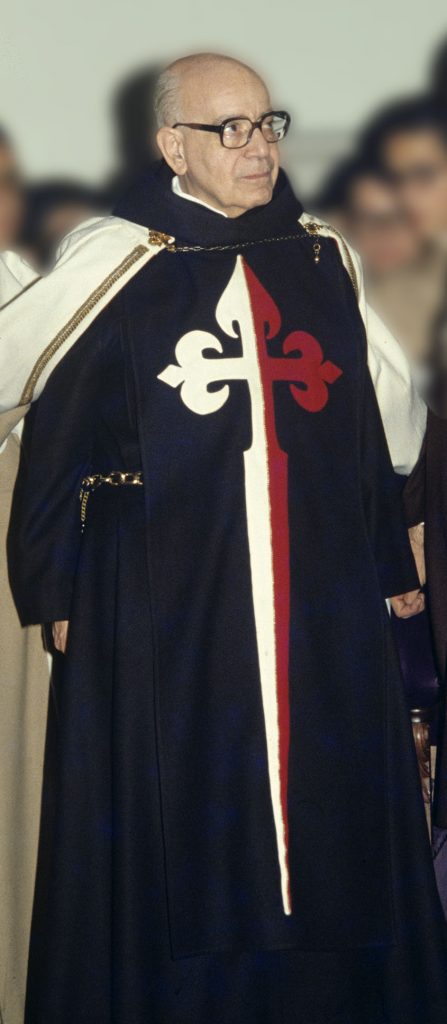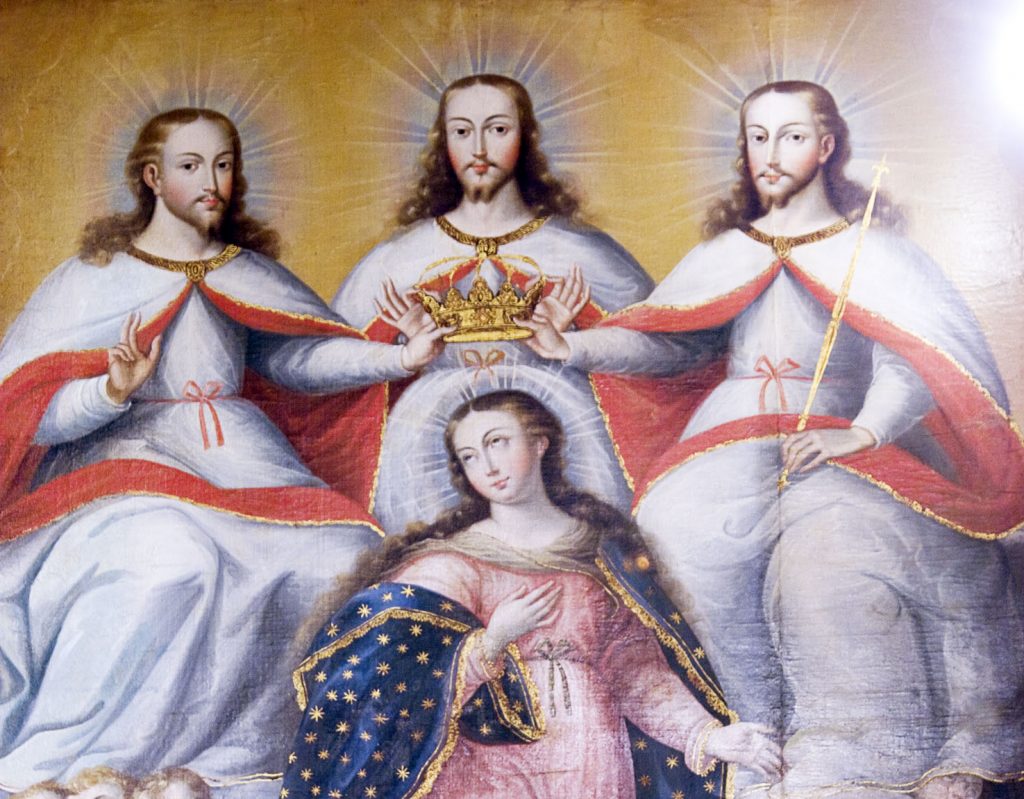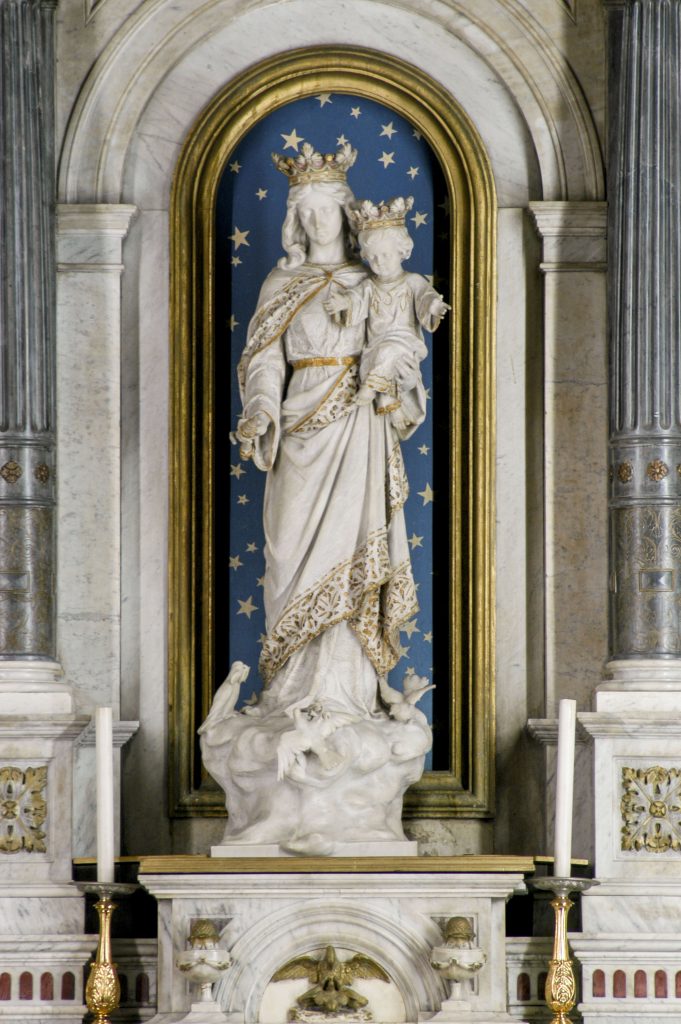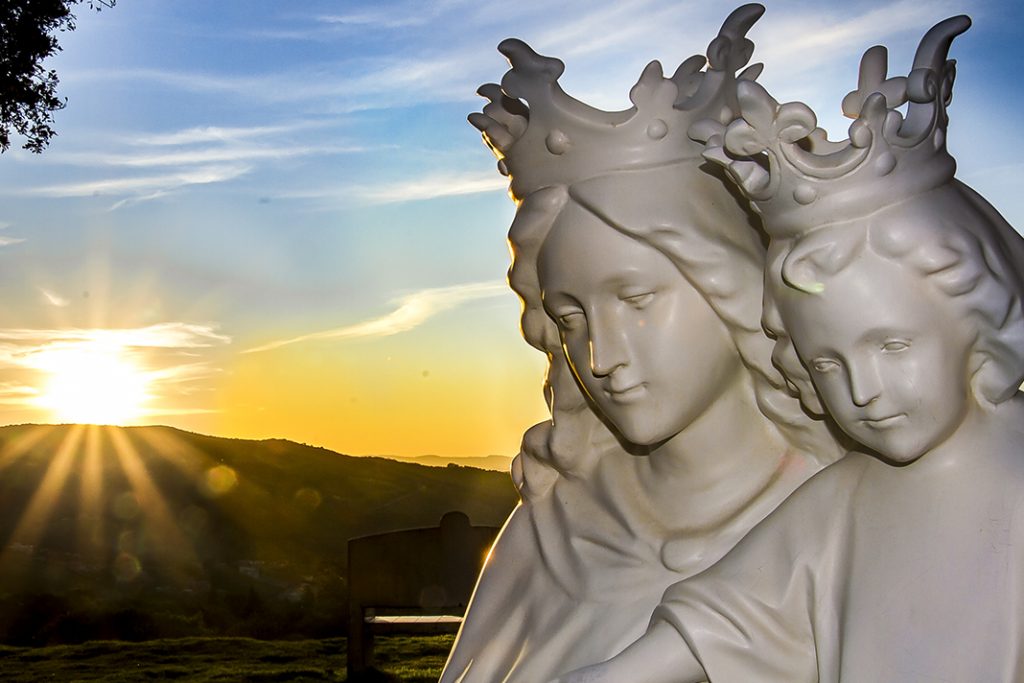Commenting on the Hail Holy Queen in his most recent book, Msgr. João unveils something of the Reign of Mary, that historical era in which the spirit of the Mother of God will be present in every creature.
For Dr. Plinio Correa de Oliveira, the Salve Regina represented the archetypal petition to Our Lady, the masterpiece of the Church’s prophetic discernment and theological zeal concerning her role in salvation history. Through this prayer, he had penetrated into the mysteries of the Sovereign Queen, and still desired to recite it when his warrior and innocent soul was about to leave this valley of tears in order to contemplate the beatific light in the eyes of his Lady and Mother:

“Above these abysses of death, beyond which is a God whom I adore, there is a bridge – which is the light of my soul and everything in my life – whose size and value I can better measure the more carefully I gauge the depth of the abyss. […] The smile above the darkness of the impasse and the bridge cast over the abyss is devotion to Our Lady. Therefore, at the hour of death we must say: Salve Regina, Mater misericordiæ… And our soul will be received into Heaven.”1
The Salve Regina resembles a piece of music: there are passages in crescendo and diminuendo, in allegro and adagio, depending on the meaning of each phrase. It is the “composition” that contains all the melodies of the relations between the Blessed Trinity and Our Lady. It could even be called “divine music” for it sums up God’s infinite longings regarding His Daughter, Mother and Spouse.
In praying it with piety, the faithful unite themselves with the desires of the Creator and enter into the mysterious bonds that unite Him to Her. In the Heart of Mary, in turn, this prayer resounds as praise and a request made by the Most High, even when pronounced by a miserable sinner. God, as it were, lends His voice to the suppliant, so that he may interact with His beloved. This is the power of the Salve Regina!
Divine grandeur contained in a creature
The Marian titles contained in this prayer have a sublimity that touches on God. As Daughter of the Eternal Father, Our Lady inherits an eminent participation in all His attributes, causing Her to touch the divine essence; as Mother of the Son, She governs His inheritance and benefits from it as Queen-Mother; as Spouse of the Holy Spirit, She shares in His goods and has full rights over them.
In this way, Mary lives of the treasure of the Trinity and contains the divine grandeur within herself, in the proportion of a creature, as if God had chosen among men a “miniature” of Himself. In other words, since it is not possible for Him to generate a new Divine Person consubstantial with the Trinity, the Creator formed Her with the purpose of making Her a “god” for Himself.
Mary contains the divine grandeur within herself, in the proportion of a creature, as if God had chosen among men a “miniature” of Himself
Now, at times, meditation on Our Lady’s invocations does not originate from their most universal and transcendent perspective, that is, from God and His attributes, but from that which is most immediate and concrete: man and His needs. Although legitimate, this viewpoint ends up constituting an obstacle to understanding the magnificence of her bond with the Most Holy Trinity, from which flows her connection with humanity.
Without wishing to make an exhaustive analysis of the invocations of this inspired and beautiful prayer, the Author will present below his reflections on some of them. As the reader will be able to verify, these considerations offer a foretaste of the splendorous glory that Mary will radiate throughout the earth in the days of her reign, and of the relationship, overflowing with goodness, forgiveness and affection, that She will establish with men.
According to St. Louis de Montfort,2 in this intimate and maternal relationship the Virgin will enlighten them with her light, nourish them with her milk, guide them with her spirit, support them with her arm and keep them under her protection. She shall be the vital sap that shall lead every one of her children and slaves of love toward union with the Sacred Heart of her Divine Son.
Queen of men, Angels and the divine will
Queen and Mother: two outstanding titles of the Blessed Virgin! All the qualities for which Our Lady is praised in the Salve Regina derive from this singular union between royalty and motherhood.
“Hail Holy Queen”! Mary bears the insignia of royal power in their plenitude: her majesty is supreme, far surpassing that of any monarch; her authority is sovereign, not dependent on human acclamation; her empire is absolute, exercised over Heaven and earth, the angelic powers and human beings. She does what She wishes, when She wishes and how She wishes. It is, therefore, a royalty that emanates from divine royalty.
Now, God is the prototype and the substance of royalty: King of His will, of His plans, of His possibles; in a word, King of Himself ever since forever. His royalty consists in the absolute governance of the Good, which is His own essence.
By a very special predilection, Our Lady participates in this royalty in a sui generis manner. It is as if God gave Himself entirely to Her and entrusted to Her the sceptre of His power, so that She might govern creation, history and – oh, unfathomable mystery! – Himself. In this regard, it can be affirmed that, by a sublime mystery, Mary is Queen even of the divine will, enjoying an omnipotent audience before the throne of the Most High.3 Everything is under her feet, and the Trinity is pleased to be ruled by His Daughter, Mother and Spouse.

It is as if God gave Himself entirely to Her and entrusted to Her the sceptre of His power, so that She might govern creation, history and – oh, unfathomable mystery! – Himself
This supposes on Our Lady’s part an intimate union with the Three Divine Persons, which makes Her incapable of doing anything contrary to Their designs. In God and in Mary, there pulsates just one Heart and one will. It is as if the Almighty had read in the Immaculate Heart this sentence: “Apart from Me you can do nothing” (Jn 15:5). The Creator has submitted Himself in such a way to the Virgin that, so to speak, without Her, He can do nothing.4
Such a bold statement must be understood cum grano salis, for God alone is the Being par excellence,5 Pure Act,6 from which all things proceed, and by whom everything is sustained in the order of being. With this caveat, it seems that the ineffable crux of Sacred Slavery to Jesus through Mary can be found here. What the Lord, by reason of His justice, could refuse to anyone who approached Him directly, will always be granted if the supplication comes from the Heart of His Most Holy Mother.
“Save me, Holy Queen!”

This is the splendour of the royalty and power of Our Lady. Thus, there is no more beautiful or efficacious invocation when having recourse to Her. Dr. Plinio, while still a boy, well understood this when he recited the Salve Regina in a time of trial.7 Judging, due to his young age, that the Latin salutation salve had the same meaning as the verb to save, he turned to Mary, Help of Christians with a cry full of filial confidence: “Save me, Holy Queen!” And She came to his aid!
Likewise, for each one of us it will be enough to cry “Save me, Holy Queen!”, and She will immediately extend her sceptre and move the will of the Father. This appeal resounds in her ears as if it were said: “Oh, Thou who art the Queen of the divine decisions and who rule the Heart of God, save me!”
The maternal heartstrings of Mary cannot resist those who in this way have recourse to her intercession. To invoke her royalty means, therefore, to invoke her supplicant omnipotence before the Lord. Nevertheless, it is necessary that the request be made with entire confidence and the certainty that She will save us.
The ultimate embodiment of divine mercy
The expression “Mother of mercy”, in turn, evokes the mother’s unique mission in family life. The father must represent steadfast goodness united to justice, and it behoves the mother to reduce this justice to small proportions, to tiny limits, almost making it disappear. She must make mercy, pardon and forbearance shine to an unimaginable degree. Harmony in the domestic environment is, properly speaking, the fruit of maternal tenderness.
Now, Our Lady stands out as the Mother of all mothers. To designate her as the “Mother of mercy” seems, to a certain extent, a redundancy. However, this title can be understood if we consider that the ordinary meaning of the word mother falls far short of her motherhood, which only has proportion with God Himself. In Mary, the limits of mercy are exhausted, so to speak: She is the ultimate embodiment of this divine attribute in a creature.
Her maternal forgiveness does not mean, however, tolerance for sin and vice, as many erroneously imagine. Conceived in fullness of grace and without any trace of original sin, Our Lady has a very clear notion of the offence that our faults represent against God and against the order established by Him in the universe. Consequently, her rejection and hatred for sin and for every kind of evil is perfect: “Perfecto odio oderam illos” (Ps 138:22).
The Blessed Virgin’s maternal forgiveness does not, however, mean tolerance for sin and vice, as many may erroneously imagine
In what, then, does her mercy consist? Precisely in obtaining greater and superabundant graces so that the repentant sinner may overcome his evil inclinations and seek with all the strength of his soul the highest degree of sanctity to which he is called. And this is where her forgiveness becomes manifest, because She disregards the requisite need of merits to obtain such benefits by copiously applying to each sinner the infinite merits of her Divine Son’s Redemption, of which She is the universal Mediatrix and generous Distributor. ◊
(To be continued)
Taken, with slight adaptations, from:
Maria Santíssima! O Paraíso de Deus revelado aos homens.
[Mary Most Holy! God’s Paradise Revealed to Men] São Paulo: Arautos do Evangelho, 2020, v.III, p.129-138
1 CORRÊA DE OLIVEIRA, Plinio. Conference. São Paulo, April 14, 1974.
2 Cf. ST. LOUIS-MARIE GRIGNION DE MONTFORT. Traité de la vraie dévotion à la Sainte Vierge, n.48.
3 Cf. Idem, n.27; 76.
4 In this regard, St. Anselm says: “God created all things, and Mary engendered God. God, who created all things, made Himself through Mary. And in this way He remade all that He had made. He, who could make all things out of nothing, did not want to remake what had been ruined without Mary […]. God begot Him outside of whom nothing exists, and Mary gave birth to Him without whom nothing subsists. Truly the Lord is with Thee, for He wanted every creature to recognize that they owe to Thee, along with Him, such a great benefit!” (ST. ANSELM OF CANTERBURY. Oratio VII).
5 The Angelic Doctor explains that, as God is the “ipsum esse subsistens”, the very concepts of existence and essence are identified in Him, as the Lord declared to Moses: “I am Who am” (Ex 3:14) [DR]. All creatures have being by participation in the divine Being (cf. ST. THOMAS AQUINAS. Summa Theologiæ. I, q.3, a.4; q.4, a.2; Summa contra gentiles. L.I, c.22; De potentia, q.7, a.2; Scriptum super Sententiis. L.I, d.8, q.4, a.1-2; q.5, a.2).
6 Cf. ST. THOMAS AQUINAS. Summa Theologiæ. I, q.3, a.7; Summa contra gentiles. L.I, c.16; 18; Scriptum super Sententiis. L.I, d.8, q.4, a.1.
7 For more details on the extraordinary grace Dr. Plinio received, see: CLÁ DIAS, EP, João Scognamiglio. O dom de sabedoria na mente, vida e obra de Plinio Corrêa de Oliveira [The Gift of Wisdom in the Mind, Life and Work of Plinio Corrêa de Oliveira]. Città del Vaticano-São Paulo: LEV; Lumen Sapientiæ, 2016, v.I, p.336-348.

